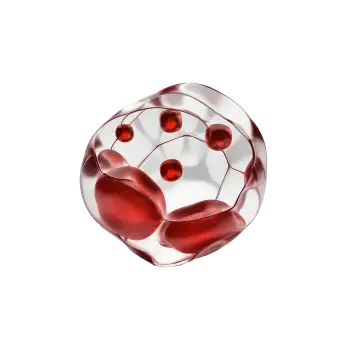The heart is a muscle that has the task of pumping blood around the body. It consists of two cavities, one on each side, which are both shaped like chambers. Heart failure can occur when the heart has insufficient pumping capacity as a result of enlargement of the cavities in either the left or right ventricle. Thickening of the heart muscle can also lead to reduced pumping ability. This can result in fluid accumulating in, for example, the legs and lungs, and other typical symptoms such as fatigue and shortness of breath occurring.
Heart failure can develop over a long period of time or appear suddenly. Acute heart failure can occur at the same time as a heart attack or in connection with, for example, blood poisoning. The most common cause of chronic heart failure is damage to the heart muscle as a result of a heart attack. Another common explanation is long-term high blood pressure. What remains is impaired blood circulation, low blood pressure, high heart rate and impaired function in both lungs and kidneys.
Common signs and symptoms
Heart failure is a disease that causes a number of symptoms. Common signs and symptoms include shortness of breath, fatigue, swelling of the feet and ankles, chest pain, and palpitations. Breathing may become faster than usual. Patients may also experience difficulty sleeping or coughing, especially at night. Additionally, a person with heart failure may find it difficult to tolerate physical exertion and may experience shortness of breath when doing strenuous activities.
Many different symptoms can be caused by heart failure, of which fatigue and shortness of breath are the most common. Edema is also a common sign. Acute heart failure often presents with sudden symptoms that require immediate treatment. Symptoms that develop over a longer period of time give a similar disease picture, but not as acute a deterioration.
Symptoms of Heart Failure in Women and Men
The symptoms of heart failure can manifest differently in women and men, which can affect how the disease is detected and treated. Here are some important differences:
1. Type of Symptoms
Women: Women tend to have more subtle and non-specific symptoms, which can sometimes make it harder to detect heart failure at an early stage. Common symptoms include:
- Extreme fatigue and exhaustion.
- Shortness of breath, especially with light exertion or at rest.
- Swelling in the ankles, legs, or abdomen.
- Nausea and digestive issues.
- Depression or anxiety.
Men: Men often have more "classic" symptoms of heart failure, which are easier to recognize, such as:
- Severe shortness of breath, especially during physical exertion.
- Rapid weight gain due to fluid retention.
- Pronounced swelling in the legs and ankles.
- Heart palpitations or irregular pulse.
- Chest pain may occur, although this is less common in heart failure than in a heart attack.
2. Heart Rate and Blood Pressure
Women: Women with heart failure often experience a faster heart rate and higher blood pressure than men. Women are also more likely to develop heart failure with preserved ejection fraction, where the heart can still pump normally but does not relax properly between beats. This can lead to more subtle symptoms and makes diagnosis more challenging.
Men: Men are more likely to develop heart failure with reduced ejection fraction, where the heart cannot pump efficiently. This often leads to more pronounced symptoms such as severe shortness of breath and extreme fatigue during exertion.
























